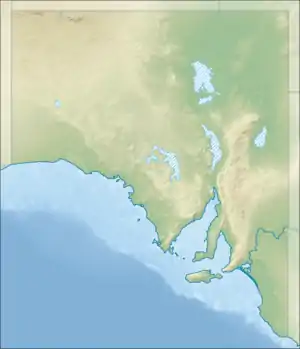| Deep Creek National Park Deep Creek & Delamere, South Australia | |
|---|---|
 Deep Creek National Park | |
| Nearest town or city | Cape Jervis[2] |
| Coordinates | 35°37′40″S 138°13′19″E / 35.62778°S 138.22194°E |
| Established | 30 September 1971[3] |
| Area | 44.96 km2 (17.4 sq mi)[4] |
| Visitation | "25,000−30,000"[lower-alpha 1] (in 1997)[5]: 20 |
| Managing authorities | Department for Environment and Water |
| Website | Deep Creek National Park |
| See also | Protected areas of South Australia |
Deep Creek National Park, formerly the Deep Creek Conservation Park, is a protected area in the Australian state of South Australia located on the southern coast of Fleurieu Peninsula in the gazetted localities of Deep Creek and Delamere about 11 kilometres (6.8 miles) east of Cape Jervis.[2][3]
History
Formerly a conservation park known as Deep Creek Conservation Park, it was renamed Deep Creek National Park upon being proclaimed a national park on 26 November 2021[6][7]
Description
The park is the largest portion of remaining natural vegetation on the Fleurieu Peninsula, and is home to much native wildlife, including western grey kangaroos, short-beaked echidnas and around 100 species of birds.[8]
The park encompasses 18 kilometres (11 miles) of coastline, which include views across Backstairs Passage to Kangaroo Island. The conservation park consists of mainly rolling coastal hills, the gullies of which contain orchids and ferns, while the hilltops have stunted scrub and low windswept trees. Walking trails (including part of the famous Heysen Trail) provide access to most of the conservation park.
It is classified as an IUCN class II protected area.[1] In 1980, it was listed on the now-defunct Register of the National Estate.[9]
Camping
The conservation park has five camping areas available with various facilities.
- Stringybark: A sheltered forest setting with 16 sites, hot showers, toilets and rain water. Sites available for caravans and camp trailers. No powered sites available.
- Trig: Central to the main hiking trails, open grassy areas with many well-sheltered and shady sites. 25 sites, toilets and rain water available. Sites available for caravans and camp trailers. No powered sites available.
- Tapanappa: 18 moderately sheltered sites with spectacular coastal views close by. Toilets and rain water available.
- Cobbler Hill: 10 sites with toilets and rain water close to Blowhole Beach. Can be exposed during windy conditions.
- Eagle Waterhole: Located on the Heysen Trail, and only able to be used by hikers. A hikers' hut and rainwater tank have been erected at this site.
Gallery
 Approaching the cove at the mouth of Deep Creek.
Approaching the cove at the mouth of Deep Creek. Looking south.
Looking south. The creek mouth.
The creek mouth. Blowhole Beach.
Blowhole Beach. Blowhole Beach looking North East.
Blowhole Beach looking North East.
See also
References
Notes
- ↑ Visitor numbers shared with Talisker Conservation Park
Citations
- 1 2 "Terrestrial Protected Areas of South Australia (refer 'DETAIL' tab )". CAPAD 2016. Australian Government, Department of the Environment (DoE). 2016. Retrieved 21 February 2018.
- 1 2 "Search result for "Deep Creek Conservation Park" (Record no SA0019531) with the following layers selected - "Suburbs and Localities" and " Place names (gazetteer)"". Property Location Browser. Government of South Australia. Archived from the original on 12 October 2016. Retrieved 8 August 2016.
- 1 2 Shard, A.J. (30 September 1971). "NATIONAL PARKS ACT, 1966: DECLARATION OF NATIONAL PARK" (PDF). The South Australian Government Gazette. Government of South Australia. p. 1226. Retrieved 11 January 2019.
- ↑ "Protected Areas Information System - reserve list (as of 17 Feb 2014)" (PDF). Department of Environment Water and Natural Resources. p. 5. Archived from the original (PDF) on 2 July 2015. Retrieved 16 March 2014.
- ↑ Deep Creek and Talisker Conservation Parks management plan, Fleurieu, South Australia (PDF), Department of Environment and Natural Resources (South Australia), 1997, p. 20, ISBN 978-0-7308-5830-0, retrieved 25 September 2019
- ↑ Speirs, David (26 November 2021). "SA now home to Australia's biggest national park". Premier of South Australia. Archived from the original on 19 December 2021. Retrieved 19 December 2021.
 Text may have been copied from this source, which is available under a Attribution 3.0 Australia (CC BY 3.0 AU) licence.
Text may have been copied from this source, which is available under a Attribution 3.0 Australia (CC BY 3.0 AU) licence. - ↑ Gooch, Declan (26 November 2021). "Australia's biggest national park declared in South Australia's far north". ABC News. Australian Broadcasting Corporation. Retrieved 19 December 2021.
- ↑ "Deep Creek National Park". National Parks and Wildlife Service South Australia. Retrieved 19 December 2021.
 Text may have been copied from this source, which is available under a Attribution 3.0 Australia (CC BY 3.0 AU) licence.
Text may have been copied from this source, which is available under a Attribution 3.0 Australia (CC BY 3.0 AU) licence. - ↑ "Deep Creek Conservation Park, Blowhole Creek Rd, Cape Jervis (sic), SA, Australia - listing on the now-defunct Register of the National Estate (Place ID 7782)". Australian Heritage Database. Australian Government. 21 October 1980. Retrieved 27 September 2019.
External links
 Deep Creek National Park travel guide from Wikivoyage
Deep Creek National Park travel guide from Wikivoyage- Official website
- Protected Planet website
- BirdsSA website